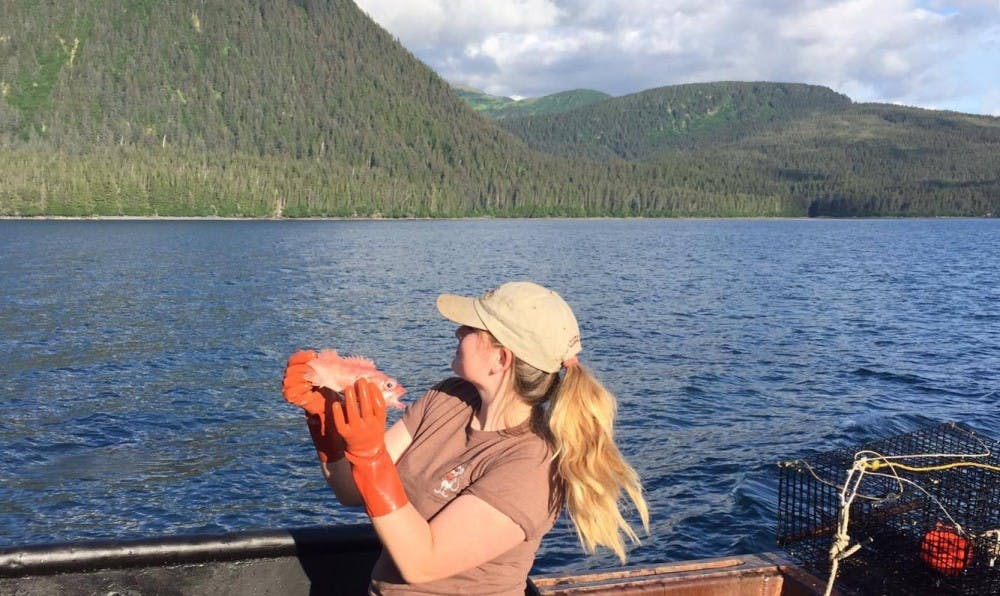College sophomore Autumn Powell is crossing gender boundaries this summer, and no, she is not working in tech or engineering. She is on a boat. In Alaska. Fishing for salmon. After months of sitting under the fluorescent bulbs of lecture halls, slaving over essays and hailing Ubers, Powell decided to head back home to Kodiak and get lost in the wilderness of the emerald isle. Don’t get us wrong, she is still working crazy hours and making bank– but no cubicle is required.
We chatted with Powell while she had service and frankly got a little envious we didn’t have the guts to ditch the 9 to 5. Read about her experience and realize you don’t need a button down to make the most of your summer.

Street : So I heard you are fishing in Alaska this summer. Tell me a little more about what you do?
Autumn Powell: I’m the cook and a deck hand, so I basically have to take all the weights of the fish and take the fish off of what catches them. The hours are very weird. We deliver sometimes in the middle of the night and maybe catch a nap somewhere in there. If I’m not working, I’m sleeping, and if I’m not sleeping, I’m working.
Street: That sounds like a lot of hard work. Is this your first summer doing it?
AP: I have spent at least some part of my summer on a boat since I was 14 years old, maybe a little younger. But I basically grew up on a boat because my dad is a crab fisherman. Two summers ago I did the same thing I'm doing now but on a different boat, and last summer I went up Bristol Bay fishing for sockeye.
Street: What made you want to go back? I feel like as college students we have this pressure to always move on to something new.
AP: It’s a good way to make money quickly, and it is a family business. I don't think I could last a whole year away from Alaska, honestly.
Street: You must have a completely different lifestyle than in Philadelphia.
AP: In a city you can't be alone, and even if you are in your room you are never more than 10, 20 feet from another human, but [here] I can go into the woods and climb a mountain just maybe 10 20 minutes from my house, and I get to be alone. It's so nice.
Street: What reactions do you get here when you tell people you are from Alaska?
AP: People ask is it white all the time, do you live in an igloo? It’s actually so funny. One of the first things they ask me is about the Deadliest Catch. I’m actually on a boat right now that was on the that show. It’s called the Seabrook.
Street: Does your job relate to what you want to do in the future?
AP: I think it most relates to how I want my personal life to be when I’m older, but it's not going to coincide easily with molecular biology at all. I would like to be a medical researcher and hopefully go to medical school. But I would love to spend a year as a biologist or medical observer on a boat.
Street: How’s the crew? Are there any other girls or people your age?
AP: It’s a very sexist industry, but the fact that I am a girl is even shocking to people that are in Alaska. I had a crew member on here who just got fired, and it was because he hit on me, and he was like double my age. His nickname for me was ‘Sugar Tits.’ Loved it [sarcastically laughs].
Street: Yikes! How did your parents feel at first about you working on a boat?
AP: I remember the first time I told my dad I wanted to go on the boat to go fishing he was really surprised. For my brother, it has always been expected, but for me it was like, ‘Oh she wants to work on a boat? Let's get her a job then.’ They were always open to it.
Street: I’m sure it has taught you a lot.
AP: It has taught me how to operate on little to no sleep, how to shut my mouth when someone is telling me how to do something because otherwise I won't do it right. It’s taught me how to be hard worker most of all.
Street: What’s the best part?
AP: My favorite part is when everyone else is asleep and you get to wheel watch. You're in open ocean, you can't see land and you get to just put on your favorite song and ride the waves.

